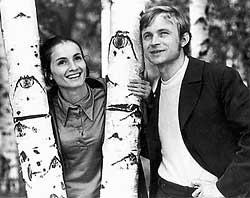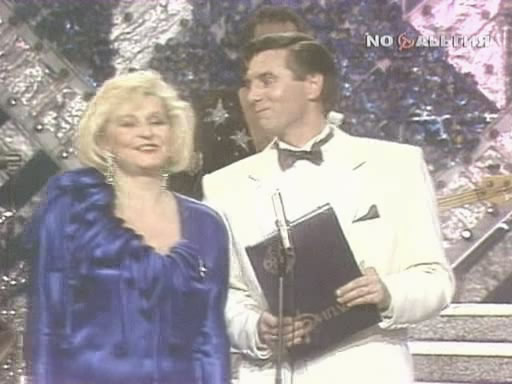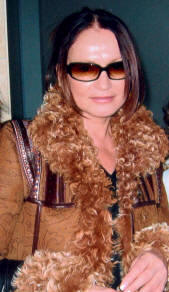Biography of SOFIA Rotaru - where she was born, what is her real name, her parents ...
It is difficult to say when and how music appeared in my life, it seems that it has always lived in me. I grew up among music, it sounded everywhere: at the wedding table, at gatherings, at parties, at dances ... "
Sofia Rotar was born on August 7, 1947 in the village of Marshintsy, Novoselytsky district, Chernivtsi region (Ukraine), and grew up there. Father - Mikhail Fedorovich Rotar, born 11/22/18-died 03/12/04, mother - Alexandra Ivanovna Rotar, born 04/17/20, died 09/16/97. Spouse: Anatoly Kirillovich Evdokimenko, born on 01/20/42, died on 10/23/02. Sisters of the singer: Rotar Zinaida Mikhailovna, Rotar Lidia Mikhailovna and Rotar Aurika Mikhailovna; there are also brothers: Rotar Anatoly Mikhailovich and Rotar Evgeny Mikhailovich. Son: Evdokimenko Ruslan Anatolyevich; grandchildren: Anatoly and Sofia.
Sophia was born in a large family of a foreman of winegrowers, the second of six children, from childhood she helped her mother and older sister raise her younger brothers and sisters.
The girl's creative abilities showed up early, from the first grade she sang in the school and church choirs. The first singing teacher was his father, who always loved to sing, having absolute pitch. At school, little Sofia learned to play the domra, as well as the button accordion. The girl was very fond of organizing concerts at home, a choir of six children could be listened to for hours. The creative atmosphere in the family and formed in Sofia, while still a child, the style of her future songs. The singer's father always said: "Sonya will be an artist!" and was right. The first success of the singer was the victory in 1962 at the regional amateur art competition, this competition gave Sofia the opportunity to participate in the regional viewing, in which she won a first degree diploma in 1963. As a winner, she was sent to Kyiv to participate in the republican competition of folk talents, at this competition Rotaru also took the first award. After this victory, Sofia firmly decided to become a singer and entered the conductor-choir department of the Chernivtsi Music College.
In 1968, after graduating from college, Rotaru was delegated as part of a creative group to Bulgaria to the IX World Festival of Youth and Students with the songs: "I'm standing on a stone", "I love spring" and "Step", here she won a gold medal and first prize in competition of folk song performers. The chairman of the jury, Lyudmila Zykina, immediately said about Rotaru: "This is a singer with a great future!" In the same year, Sofia Rotaru married Anatoly Evdokimenko, a student of Chernivtsi University and a trumpeter of the student variety orchestra.
In 1971, at Ukrtelefilm, director Roman Alekseev made a musical film about the tender and pure love of a mountain girl and a Donetsk boy - "Chervona Ruta" (Chervona Ruta is the name of a flower taken from an ancient Carpathian legend. Ruta blooms only on the night of Ivan Kupala , and the girl who manages to see the blooming rue will be happy in love). Sofia Rotaru became the main character of the film. The songs of the composer V. Ivasyuk and other authors were also performed by V. Zinkevich, N. Yaremchuk and other singers. The picture was a significant success. And when Sofia Rotaru received an invitation to work in the Chernivtsi Philharmonic and create her own ensemble, the name of the ensemble appeared by itself - "Chervona Ruta".
The debut of "Chervona Ruta" was a performance in Star City in front of Russian cosmonauts. Sofia Rotaru and the ensemble "Chervona Ruta" for the first time declared themselves as outstanding representatives of a whole trend of domestic pop art, a characteristic feature of which is the combination of elements of folk music with modern rhythms in the repertoire and style of performance. Then she sang in Moscow on the stage of the Central Concert Hall "Russia", the Kremlin Palace of Congresses and on the stage of the Variety Theater.

Debuting in the capital, Sofia Rotaru least of all resembled a timid newcomer. By that time, she was already quite a mature master. The external restraint of the singer, leaving no room for fussiness and unjustified gestures, was in harmony with the flight of her overly expressive voice. Since 1971, Sofia has been counting down her professional creative activity. In 1972, Sofia Rotaru and the Chervona Ruta ensemble took part in a tour of Poland, and in 1973 in the city of Burgas (Bulgaria) the Golden Orpheus competition was held, in which the young singer performed the songs: "My City" and "Bird" , for their performance, Rotaru receives an award of the first degree.  Songs performed by her "Codry" and "My City" in Moldovan were recorded in the film "Spring Consonances - 73". The song "My City" became the laureate of the festival "Song-73".
Songs performed by her "Codry" and "My City" in Moldovan were recorded in the film "Spring Consonances - 73". The song "My City" became the laureate of the festival "Song-73".
In 1974, Sofia Rotaru graduated from the Kishinev Institute of Arts named after Muzychesku and became a laureate of the Amber Nightingale festival in Sopot (Poland), where she performed B. Rychkov's "Remembrance" and V. Ivasyuk's "Vodohrai". For the performance of the Polish song from the repertoire of Halina Frontskowiak "Someone" (Russian text by A. Dementiev), the singer received the second prize. In 1975 she became a soloist of the Crimean Philharmonic.
Since the 1970s, songs performed by Sofia Rotaru have constantly become laureates of the Song of the Year.
In 2001, Sofia Rotaru performed in a new solo concert program "My life is my love!". The expression of the 1970s was supplemented by the lyricism of the 1980s, the drive of the 1990s ... and the current game of halftones, on which Rotaru the director, Rotaru the singer builds her program, combining new songs and hits of past years, read in a new way, refracted from today's point of view. Many of her songs, no matter how many years ago they were sung, do not fit into the "retro" format, continuing to live in every new concert program of the singer.
During her time on the stage, Sofia Rotaru has already managed to act in films without being a professional actress: "The Song will be among us" (1974), "Sofia Rotaru invites you" (1985), "Monologue about love" (1986), "Golden heart "(1989)," Caravan of Love "(1990)," New songs about the main thing "(1996)," 10 songs about Moscow "(1997), and also starred in the feature films" Where are you, love? (1980, the film received a prize at the VKF in Vilnius in 1981) and "Soul" (1981). She continues to act in many New Year's musicals and does it with great success!
Sofia Rotaru has the titles - People's Artist of the USSR (1988), People's Artist of Ukraine (1976), People's Artist of Moldova (1983), laureate of the Republican Komsomol Prize named after N. Ostrovsky (1977), laureate of the Lenin Komsomol Prize (1978), laureate of the "  Ovation" (1996; 2000 - for a special contribution to the development of the Russian stage), laureate of the Klavdiya Shulzhenko Prize "The Best Pop Singer of 1996" (Moscow), laureate of the All-Ukrainian Prize in the field of music and mass spectacles "Golden Firebird-99" ( 1999), "Prometheus-prestige" award (2000, Kyiv), winner of the honorary prize of the President of Ukraine for an outstanding contribution to the development of pop art "Song Vernissage" (1997, Kyiv). In 2000 in Kyiv she was named Person of the Year and the best Ukrainian pop singer of the XX century, was awarded the title "Golden Voice of Ukraine".
Ovation" (1996; 2000 - for a special contribution to the development of the Russian stage), laureate of the Klavdiya Shulzhenko Prize "The Best Pop Singer of 1996" (Moscow), laureate of the All-Ukrainian Prize in the field of music and mass spectacles "Golden Firebird-99" ( 1999), "Prometheus-prestige" award (2000, Kyiv), winner of the honorary prize of the President of Ukraine for an outstanding contribution to the development of pop art "Song Vernissage" (1997, Kyiv). In 2000 in Kyiv she was named Person of the Year and the best Ukrainian pop singer of the XX century, was awarded the title "Golden Voice of Ukraine".
In 1996, in Yalta, Sofia Rotaru's nominal star was laid on the square in front of the Yubileiny concert hall. In May 2002, the laying of the singer's personal star ("Star of Ukraine") took place on the Avenue of Stars near the International Center for Culture and Arts in Kyiv, with the presentation of an honorary diploma and the badge "Ukrainian Variety Star" to her. All the victories cannot be counted, there are so many of them and there will be more than one!
In the work of Sofia Rotaru, the most important contact is with the song, with its creators. When Sofia Rotaru enters the stage and starts to sing, you forget about everything in the world. Her transparent, charming voice penetrates the soul, excites and conquers everyone who loves the stage, loves the song. Here she stands in front of the microphone in the spotlight - slender, festive, like a spring twig. How much charm, beauty, how much sincerity and excitement are in her, when in the beautiful language of music and poetry she confidentially shares with us everything that pleases and saddens her ...




